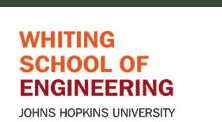Graduate Programs: Courses
540.621 Advanced Chemical Engineering Thermodynamics I
A comprehensive examination of the fundamental laws, principles, and concepts of classical statistical thermodynamics. Detailed discussion of various topics such as the properties of pure fluids, the thermodynamics of flow processed, chemical reaction equilibria, and equations of state, solutions, and phase behavior.
Paulaitis / 3 hours
540.623 Phase Equilibria
Equilibrium properties of pure and mixed fluids. Modern methods of applying classical and statistical thermodynamics to calculation of phase behavior of fluid mixtures. Molecular thermodynamics of multicomponent systems with applications to separation operations.
Donohue / 3 hours
540.624 Applied Statistical Thermodynamics
A review of introductory course concepts (i.e., the cannonical ensemble, other ensembles, the ideal monatomic gas, ideal diatomic and polyatomic gases), imperfect gases, corresponding states, distribution functions, perturbation theories, nucleation. Prerequisite: six weeks or more of introductory level statistical mechanics or statistical thermodynamics.
Katz / 3 hours
540.625 Topics in Cellular Engineering
(For description, see 540.425)
Konstantopoulos / 3 hours
540.626 (E) Introduction to Biomacromolecules
[For description, see 540.426]
Wirtz / 3 credits
540.633 Engineering Aspects of Controlled Drug Delivery
[For description see 540.433]
Hanes / 3 hours
540.637 (E,N) Application of Molecular Evolution to Biotechnology
[For description, see 540.437]
Ostermeier / 3 credits
540.642 Advanced Chemical Kinetics and Reactor Design
Complex reaction networks;Wei-Prater analysis; the Himmelblau-Jones-Bischoff method. Detailed coverage of Hougen-Watson models for heterogeneous catalytic reaction kinetics; model discrimination and parameter estimation. Other topics include coupled heterogeneous reaction and transport, generalized moduli catalyst deactivation models, batch reactors, CSTRs, and PFRs; fixed bed reactors including stability criteria, and multibed optimization; residence time distributions and non-ideal reactor models; fluidized bed and multiphase reactors. Prerequisite: linear algebra.
Staff / 3 hours
540.651 Advanced Transport Phenomena
This course is a one-semester survey of convection and convective transport. The conservation equations of mass, linear momentum, angular momentum, and energy are derived for single component systems. Exact solutions to the Navier-Stokes equations are derived. The behavior of fluid particles in the creeping flow limit is studied in detail. Inertial effects in these systems are then discussed. Scaling arguments for nondimensionalizing governing equations and asymptotic methods are introduced. The lubrication and boundary layer equations are derived. Weak convective effects in heat and mass transfer are discussed.
Stebe / 3 hours
540.725-726 Topics in Molecular Thermodynamics
Lectures are presented on current topics relevant to molecular thermodynamics.
Donohue / 2 hours
540.801-802 Graduate Research
1-12 hours
540.811-812 Graduate Independent Study
1-3 hours
PART-TIME GRADUATE COURSES
545.616 Transport Properties
Gas and liquid transport properties determine the flow of mass, momentum and energy , as well as more exotic properties, in gases and liquids not at equilibrium. The prediction and understanding of the processes underlying these fluxes can be important in the design of chemical process plants. The course develops the modern theory of gas and liquid transport properties from a physically convincing, but not mathematically rigorous, perspective to acquaint students with the transport properties of real molecules and the methods of estimating them. Subjects include Boltzmann equations for real molecules, methods of deducing transport properties from them, and methods of estimating transport properties from molecular modes. The course also examines the estimation of transport properties in ionized gases, dense gases and liquids. Applications are made to Brownian motion and to the evaporation of the heat transfer to aerosols.
Hunter
545.642 Advanced Chemical Kinetics and Reactor Design
Complex reaction networks;Wei-Prater analysis; the Himmelblau-Jones-Bischoff method. Detailed coverage of Hougen-Watson models for heterogeneous catalytic reaction kinetics; model discrimination and parameter estimation. Other topics include coupled heterogeneous reaction and transport, generalized moduli catalyst deactivation models, batch reactors, CSTRs, and PFRs; fixed bed reactors including stability criteria, and multibed optimization; residence time distributions and non-ideal reactor models; fluidized bed and multiphase reactors. Prerequisite: linear algebra.
Staff / 3 hours








